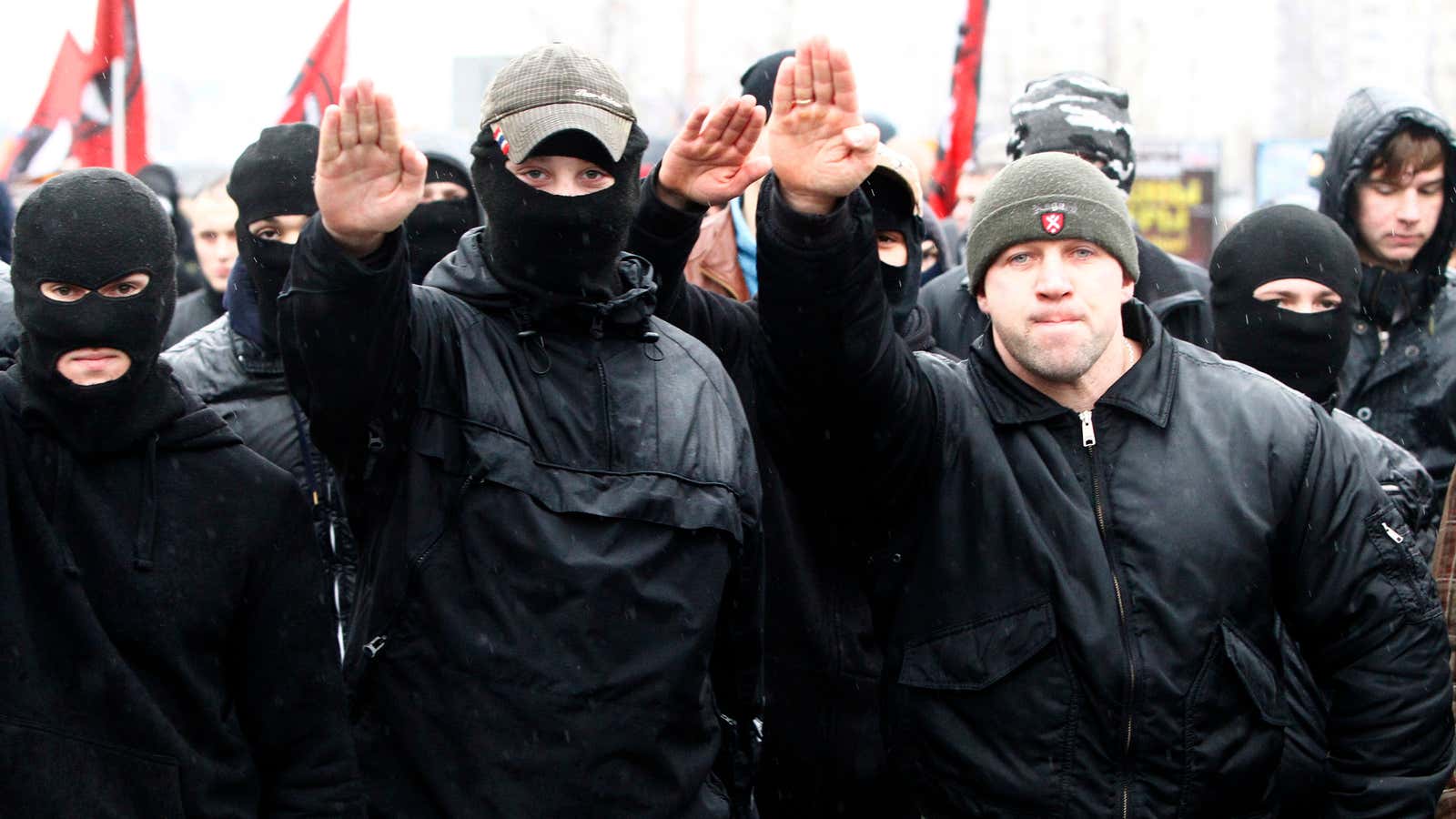For America’s white nationalists, there is only one nation—and one leader—worth emulating. And it has nothing to do with lederhosen or Wagner.
Richard Spencer, the current face (and haircut) of US’s alt-right, believes Russia is the “sole white power in the world.” David Duke, meanwhile, believes Russia holds the “key to white survival.” And as Matthew Heimbach, head of the white nationalist Traditionalist Worker Party, recently said, Russian president Vladimir Putin is the “leader of the free world”—one who has helped morph Russia into an “axis for nationalists.”
For those Americans who are just now familiarizing themselves with Russia’s current political proclivities—due to the recent, high-profile Russian hacking allegations, say, or the brutal military campaign in Aleppo—Moscow’s transformation into a lodestar for America’s white supremacists is enough to cause whiplash. After all, just a few decades ago Moscow was a beacon for the far-left, and its influential Communist International provided material and organizational heft for those pushing Soviet-style autocracy around the world. Over the past few years, however, the Kremlin has cultivated those on the far-right end of the West’s political spectrum in the pursuit, as Heimbach told me, of reifying something approaching a “Traditionalist International.”
Moscow’s appeal to the American far-right is, in a sense, understandable, if no less worrying. The links between Russia and America’s white nationalists and domestic secessionists have both expanded and deepened over the past few years. And the Kremlin, as with its invasion and occupation of swaths of Ukraine, has gone to only minimal lengths to obscure such ties.
Following the chaos of the Soviet dissolution in the 1990s, Putin’s kleptocracy has restored the state to domestic primacy. Moreover, Putin has positioned Russia as a leader for those in the West attempting to roll back liberal policies, from abortion and LGBT rights to dissolving the distance between church and state. Meanwhile, Moscow has been busily cultivating relationships with far-right groups in Europe, from radical right-wingers in Hungary to Marine LePen, one of the front-runners for the upcoming French presidency.
But links between Moscow and America’s white supremacy movement are far deeper than approving rhetoric. Spencer, for instance, who has said that he “admire[s]” Putin and who has called to break up NATO, also helped organize a 2014 conference in Hungary that was slated to feature, of all people, Alexander Dugin. A political philosopher, Dugin is both an erstwhile Kremlin confidant and the progenitor of modern “Eurasianism,” which places, in part, Russia as the center of global anti-liberalism. Dugin, whose Foundations of Geopolitics continues to be assigned to every member of Russia’s General Staff Academy, was unable to attend the conclave in Hungary due to Western sanctions. But Spencer nonetheless remains married to one of Dugin’s English translators.
Traditionalist Worker Party leader Heimbach—who has led rallies featuring both Confederate and Russian imperial flags flying side-by-side—has yet to visit Russia, but was planning on attending a recent conference in St. Petersburg that would have gathered together heads of the assorted neo-Nazi and white supremacist contingents across the West. The conference, postponed until March, was organized by a group with ties to Russia’s deputy prime minister, and would have been the second iteration of the gathering. The 2015 conference featured both “race realist” Jared Taylor and former KKK lawyer Sam Dickson. All the while, Heimbach has continued expanding the reach of the TWP in the US. The party’s 2015 launch included, of all things, a Skyped-in speech from none other than Dugin.
David Duke, meanwhile, sees Russia as a country that “presents an opportunity to help protect the longevity of the white race,” according to the Anti-Defamation League. And a few years ago, the Southern Poverty Law Center detailed Duke’s close personal ties with another American neo-Nazi, Preston Wiginton, who has made Moscow his adopted home.
Thus far, no smoking gun financial links have been uncovered between the Kremlin and those who would fracture the US in pursuit of a whites-only enclave. The same can’t be said, however, of ties between Moscow and those who would pursue more traditional means of secession. A few months ago, the Kremlin helped finance a secessionist conference in Moscow, bringing together contingents from Ireland, Spain, and Italy—as well as those from Texas, Puerto Rico, and California. Indeed, the head of the main group pushing California secession, Louis Marinelli, not only lives in Russia, but opened an “Embassy of the Independent Republic of California” in Moscow on Sunday. As Marinelli told a Russian interviewer last month, “In Russia, we have partners who are ready to support us in our aspiration.”
These secessionists, as the California movement indicates, aren’t solely of a far-right bent. But like the white nationalists undergirding Donald Trump’s presidential campaign, they all share the same goal: the fragmentation of the United States. And the Kremlin—alongside its hacking campaigns, and in tandem with its push to undercut Western alliance structures—has been only too happy to cultivate rhetorical, financial, and organizational support for these movements.
As 2017 dawns, there’s little likelihood these movements, and these ties, are going to fade during the Trump administration. If anything, the ranks of white nationalists emboldened by Trump’s success will almost certainly swell—as will those who would seek to crack the US under the auspices of secession. And, now, these individuals have found a common foreign backer, and in some cases, foreign financier.
As Heimbach recently said, “Russia’s our most powerful ally. Imagine what could happen to our party when Russia takes interest.” It’s clear, by now, that Russia has taken interest—and with the Trump administration approaching, we may not longer have the luxury of simply imagining just what the fallout of such relationships will be.




